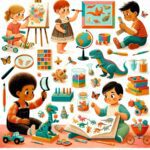Understanding how to foster curiosity and exploration in infants is pivotal in shaping the architects of tomorrow. From the moment they open their eyes to this world, infants are eager to learn, understand, and navigate their surroundings. This article delves deep into nurturing this innate curiosity and transforming it into a powerful tool for exploration and learning.
The Foundation of Curiosity in Infants
Curiosity, the desire to explore and understand, is not just a trait but a fundamental aspect of human development. It is through curiosity that infants begin to grasp the world around them, learning and growing at an astonishing rate. By fostering curiosity and exploration in infants, we lay the groundwork for a lifetime of discovery and innovation.
Research underscores the significance of nurturing curiosity from an early age. According to studies, encouraging exploration and inquiry in young children leads to better problem-solving skills, creativity, and academic performance later in life (Centre for Early Childhood Development). This makes it clear that the role of curiosity in early development cannot be overstated.
Strategies to Encourage Curiosity and Exploration
How then, can we encourage this natural inclination towards curiosity and exploration? The answer lies in creating an environment that not only allows but encourages infants to explore, make mistakes, and learn. Here are some strategies to consider:
- Offer a variety of stimuli: Introduce different textures, sounds, and colors. Toys that offer sensory experiences, like those suggested on Choosing Toys to Support Developmental Milestones at Various Stages, can significantly boost curiosity.
- Encourage exploration: Allow infants the freedom to move and explore their environment safely. Creating a secure exploration space as outlined in Setting Up a Developmentally Stimulating Play Area at Home can be highly beneficial.
- Be responsive to their interests: Notice what catches your baby’s attention and provide more opportunities to explore those interests further.
Additionally, engaging in play activities that stimulate cognitive development, as recommended in Games to Enhance Memory and Concentration in Toddlers, can further encourage curiosity and exploration.
How to Foster Curiosity and Exploration in Infants Through Daily Routines
Incorporating curiosity and exploration into daily routines can be a seamless way to enhance your infant’s development. This could include activities like narrating your day, which not only enriches language development but also sparks curiosity about everyday events.
Moreover, introducing books and storytelling at a young age, as emphasized in Building a Reading Routine for Language and Emotional Development, can play a critical role in fostering curiosity. Stories open doors to new worlds, ideas, and questions, laying a strong foundation for a curious and questioning mind.
In conclusion, fostering curiosity and exploration in infants is not just about providing toys or activities; it’s about creating an environment that encourages questioning, exploration, and discovery. By following these strategies, parents and caregivers can nurture their infant’s natural curiosity, setting the stage for a lifetime of learning and growth.













